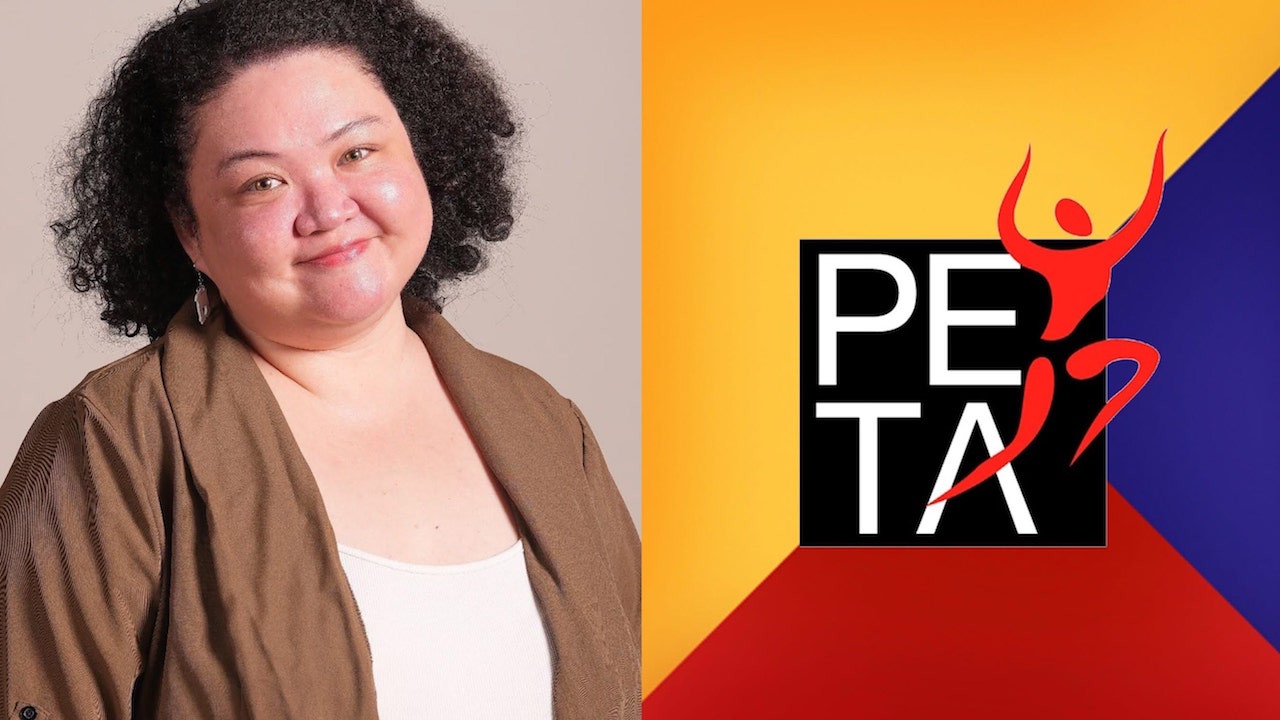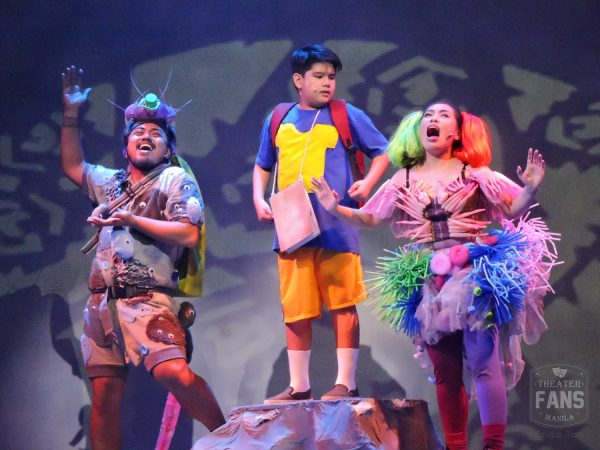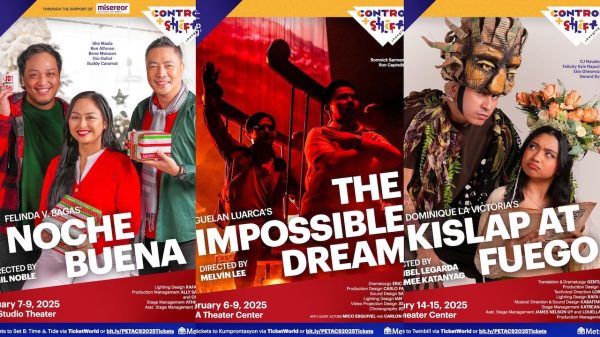
PETA’s New Artistic Director J-mee Katanyag: Shifting Narratives And Continuing the Legacy
“Hindi ko talaga na-imagine na magiging Artistic Director ako, promise!”
A then-journalism student who admittedly only joined a theater organization because her classmates were doing the same thing, teenage J-mee Katanyag had no idea it would eventually lead to her becoming one of PETA’s newest leaders.
When TheaterFansManila.com sat down with J-mee to talk about her years with the Philippine Educational Theater Association and her new role, she said she’s no stranger to impostor syndrome: “Siyempre, medyo [mapapaisip] ka na, karapat-dapat ka ba? Pero nilalagay ko yung mindset ko na ‘hindi naman ikaw yung source lang nung gagawin mo’. Mayroon ka namang miyembro, tapos huwag kang ma-insecure din na mas magaling yung ibang tao, kasi ang point, mayroon kang grupo ng mga tao na magagaling. Ikaw lang yung magfa-facilitate.”
“Kasi hindi naman ako yung katulad ng iba na creative genius o visionary. I don’t see myself like that. Pero I could see myself as someone who could collaborate or see these things and then put them together. Baka ‘yon yung pwede kong maging ambag: maging curator or manager ng mga awesome talents na mayroon yung PETA at yung mga magiging guest artists at collaborators namin.”
A would-be artistic director’s origin story
The first PETA play J-mee watched was Walang Himala for a school requirement, and it certainly made an impact. “First time ko yata manonood ng play na may pinag-uusapang social issue…[it was about] looking back 20 years after the EDSA revolution. During that time, syempre hinahanap mo yung sarili mo, ano yung mga gustong ipaglaban sa buhay kahit college ka pa lang.”
The show’s closing song, specifically, was unforgettable for J-mee. “Hindi ko na matandaan yung lyrics, pero parang ang point is, ‘Sa lahat ng ginagawa natin, masasayang nalang ba lahat ng ‘to?’ Tapos bigla akong parang naiyak, na hindi ko alam kung bakit. Sabi ko sa sarili ko, ‘May ganito palang theater? Yung parang mino-move ka into doing something.’”
Through UST’s student organization Artistang Artlets, J-mee became a scholar for a PETA theater workshop and eventually joined the company’s youth arm, the Metropolitan Teen Theater League. With MTTL, J-mee was able to tour the country to promote voter education for the 2009 elections. “Doon ko nakita na bukod sa may teatro pala na gumagawa ng social transformation using theater, theater is not just about performing plays, it’s about using theater arts in workshops, creative processes, to really be empowered and to talk about stuff like this para din tumulong sa nation building. And for an 18 or 19-year-old na naging parte noon, ang life-changing niya. May magagawa ka pala kahit bata ka. Ito pala yung power nito,” an emotional J-mee shared.
“Nilamon ng sistema”
J-mee’s relationship with PETA—where she also found the love of her life—has lasted for more than a decade now. In her own words, “Nilamon na ako ng sistema ng PETA.”
She started by acting and working more on the production management side of theater. As a twenty-something exploring new things, J-mee eventually submitted her original script Betang to the Cultural Center of the Philippines’ Virgin Labfest without telling anyone. Her play got in, was produced, and when the community learned about it, she was asked to write more scripts both for theater and television.
J-mee’s first major play for PETA’s advocacy arm Lingap Sining was Padayon, staged after Typhoon Yolanda. It focused on healing and aimed to be an educational tool on how to be prepared for similar disasters. J-mee got to interview Yolanda survivors and channel their experiences into the script. Some of her favorite original scripts also include Charot and the Gawad Buhay awardee Tagu-Taguan Nasaan Ang Buwan?. Her involvement with William, PETA’s rock musical about high school students being “forced” to study Shakespeare, and Living Voices, a documentary about PETA’s leaders throughout the years, were also significantly proud moments.

L-R: Ngo (Roi Calilang), Popoy (Albert Silos), Prinsesa Mina (Joan Bugcat) in Tagu-taguan Nasaan ang Buwan?
Continuing PETA’s intimidating legacy
J-mee is no stranger to challenging situations. Her first major show as a production manager was Care Divas. “Parang kaka-graduate ko lang ng college noon tapos pinag-PM nila ako,” J-mee said, adding that she got intimidated by the show’s cast and their strong personalities, even crying at times as a first-timer. She also found it challenging when a PETA show was brought to the international stage and there were no older company members to back her up.
There have also been times when J-mee would question her involvement in the arts. “Throughout the years, siyempre, may mga times na malilito ka, mapapagod ka sa ginagawa mo sa art, kung ba’t ko ba ‘to ginagawa. Wala naman itong kita or di ko naman ikakayaman ito or minsan may mga demands for mainstreaming and stuff. [But] I always go back to why I’m doing this.”
Now, J-mee’s challenge is being PETA’s new Artistic Director, as there is a lot of pressure—from herself mostly. “Bukod sa privilege na syempre ikaw yung next AD, ang susundan mo ay yung legacy nina Beng Santos-Cabangon as executive director, ni CB Garrucho as president, at ni Maribel Legarda as artistic director. Jino-joke ko nga, kasing edad ko yung tagal mo sa PETA, paano ko ‘to papantayan? It’s both a pressure and a privilege to build on that legacy. Both pressure and ‘itutuloy po natin yung laban.’”
Before the pandemic, J-mee was already undergoing training along with other future leaders of the company. More recently, through a combined nomination and appointment process, J-mee became Artistic Director. PETA has also introduced Melvin Lee as President, Anj Heruela and Michelle Ngu-Nario as Executive Directors, Norbs Portales as Curriculum Director, and Mitch Go as Marketing Director.
View this post on Instagram
What the future looks like
So the big question is, what can we expect to take away from PETA’s future shows?
In the short term, J-mee shared that she wants audiences to be empowered to imagine a better future after watching a PETA production. In the long term, she hopes the company’s plays would actually urge audiences to move towards change for themselves, for the people around them, and even for the country.
J-mee highlighted the ‘narrative change’ approach, which audiences can witness through PETA’s Control + Shift: Changing Narratives Festival. “Ang point kasi ng ‘narrative change’ is you see the power of stories—the chismis, the news—and how they shape our mindsets and worldviews. These stories can frame how you think and how you imagine. And sometimes, these same stories are used by those powerful to create, to distort, and to weaponize it. Lalo na recently, para siyang battle of narratives at kung paano tayo naapektuhan lagi doon sa mga opinyon natin. Importante na mayroon tayong magawa in terms of paano ba natin ishi-shift yung narratives na ito para sa empowerment ng mga tao at hindi ng iilan lang? And that empowerment doesn’t have to be the ‘rah-rah-rah’ [kind], it could be like a safe or accountable space for people, for the marginalized, for a group of friends, or a creative space for someone who wants to thrive and create on his or her own.”
“Ang gusto kong takeaway is hindi lang tayo nagpo-produce ng kwento, kundi yung mga audience or participants ng workshops ay maging part sila doon sa pagkukwento. Ginagawa na ito ng PETA ever since, iba-iba lang yung paraan,” J-mee stressed. “Ang gandang paigtingin ulit ‘yon—kung paano natin magagamit yung mga kwentong kinu-kwento natin hindi lang para ma-engage yung audience, pero para tumulong din yung teatro na dalhin sila sa kung anong kailangang gawin para may pagbabago.” J-mee shared that she also wants to focus on the “Pinoy lens” and Filipinos’ relationships with the rest of the world when creating a new production or adapting international plays.
When it comes to her vision for PETA in the next 10 years, J-mee hopes the organization will be more widely recognized not just for its commercial plays but also for the company’s theater for development programs, which have been present since the 1960s. She also hopes PETA could collaborate more with other regional, local, and international theater companies.
J-mee told TheaterFansManila.com that PETA is constantly expanding its reach through programs like summer workshops and community organizing using theater. When it comes to being more accessible economically, PETA continues to find the right timpla by staging commercially successful shows like Rak Of Aegis and One More Chance while also producing more affordable shows to expose Filipinos to theater.
“Kailangan sustainable ka. Hinahanapan namin ng paraan kung paano kami makakalikha ng something na accessible, but at the same time kumikita kami sa isang proyekto.” According to J-mee, “It’s all about balance. You have to do the commercial plays na ‘mahal’, because ‘yon yung totoong presyo para ma-produce yung mga ganoong plays. But at the same time, gagawa ka pa rin ng mga production, workshops, or processes na accessible, na makakasali yung mga tao na hindi nila kailangan magbayad ng malaki.”
Empowering the next generation
As TheaterFansManila.com wrapped up the interview, J-mee shared that at PETA, it’s only in trying that one truly learns during workshops, even if they are afraid of making mistakes. “It’s harder nowadays to make mistakes but the thing about PETA is, even though it’s expensive to make mistakes, may trust pa rin sila [sa’yo]. In order to learn things, kailangan nila yung tiwala para i-bato ka nila. And I think that’s one of the things na nakaka-empower at hopefully mapasa namin sa susunod [na generation]. Hindi yung tinapon ka lang sa pool na hindi ka safe, pero yung idea ng empowerment na go, just jump, kasi may safety nets naman, andito naman kami.”
And just like what PETA taught her, it looks like J-mee is ready to jump into this exciting era and introduce the theater community to new, empowering, and narrative-shifting productions. We’re going to stay tuned, that’s for sure!
*Answers have been edited for clarity.



Comments